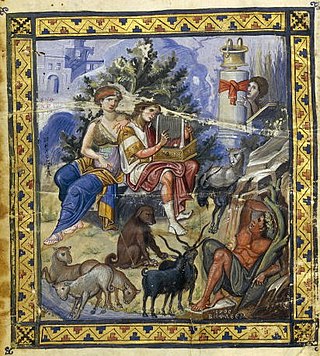
The Book of Psalms, also known as the Psalms, or the Psalter, is the first book of the third section of the Tanakh called Ketuvim ("Writings"), and a book of the Old Testament.
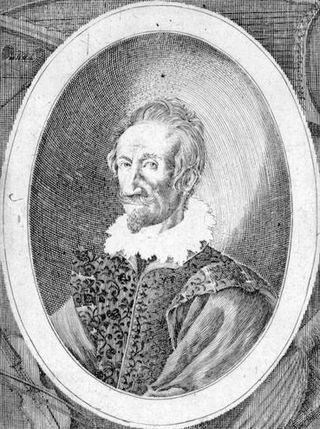
Claude Goudimel was a French composer, music editor and publisher, and music theorist of the High Renaissance.

A metrical psalter is a kind of Bible translation: a book containing a verse translation of all or part of the Book of Psalms in vernacular poetry, meant to be sung as hymns in a church. Some metrical psalters include melodies or harmonisations. The composition of metrical psalters was a large enterprise of the Protestant Reformation, especially in its Calvinist manifestation.
Psalm 151 is a short psalm found in most copies of the Septuagint (LXX), but not in the Masoretic Text of the Hebrew Bible. The title given to this psalm in the Septuagint indicates that it is supernumerary, as no number is affixed to it. The psalm is ascribed to David. It is also included in some manuscripts of the Peshitta. The psalm concerns the story of David and Goliath.

The Symphony of Psalms is a choral symphony in three movements composed by Igor Stravinsky in 1930 during his neoclassical period. The work was commissioned by Serge Koussevitzky to celebrate the 50th anniversary of the Boston Symphony Orchestra. The symphony derives its name from the use of Psalm texts in the choral parts.

Psalm 23 is the 23rd psalm of the Book of Psalms, beginning in English in the King James Version: "The Lord is my shepherd". In Latin, it is known by the incipit, "Dominus regit me". The Book of Psalms is part of the third section of the Hebrew Bible, and a book of the Christian Old Testament. In the slightly different numbering system used in the Greek Septuagint and Latin Vulgate translations of the Bible, this psalm is Psalm 22.

Psalm 89 is the 89th psalm of the Book of Psalms, beginning in English in the King James Version: "I will sing of the mercies of the LORD for ever". In the slightly different numbering system used in the Greek Septuagint and Latin Vulgate translations of the Bible, this psalm is Psalm 88. In Latin, it is known as "Misericordias Domini in aeternum cantabo". It is described as a maschil or "contemplation".

Psalm 103 is the 103rd psalm of the Book of Psalms, beginning in English in the King James Version: "Bless the LORD, O my soul". The Book of Psalms is part of the third section of the Hebrew Bible, and a book of the Christian Old Testament. In Latin, it is known as "Benedic anima mea Domino". The psalm is a hymn psalm.
Syriac sacral music is music in the Syriac language as used in the liturgy of Syriac Christianity. Historically it is best known from and important for its part in the development of Christian sacred music since Antiquity.
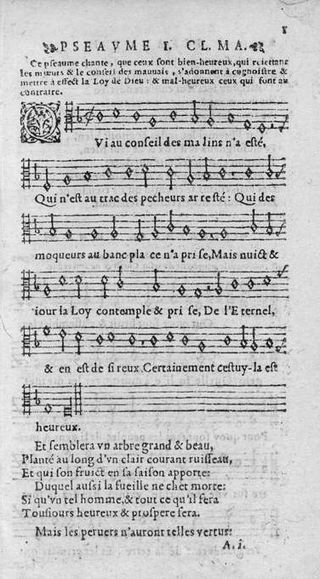
Exclusive psalmody is the practice of singing only the biblical Psalms in congregational singing as worship. Today it is practised by several Protestant, especially Reformed denominations. Hymns besides the Psalms have been composed by Christians since the earliest days of the church, but psalms were preferred by the early church and used almost exclusively until the end of the fourth century. During the Protestant Reformation, Martin Luther and many other reformers, including those associated with the Reformed tradition, used hymns as well as psalms, but John Calvin preferred the Psalms and they were the only music allowed for worship in Geneva. This became the norm for the next 200 years of Reformed worship. Hymnody became acceptable again for the Reformed in the middle of the nineteenth century, though several denominations, notably the Reformed Presbyterians, continue the practice of exclusive psalmody.
Ambrosian chant is the liturgical plainchant repertory of the Ambrosian rite of the Roman Catholic Church, related to but distinct from Gregorian chant. It is primarily associated with the Archdiocese of Milan, and named after St. Ambrose much as Gregorian chant is named after Gregory the Great. It is the only surviving plainchant tradition besides the Gregorian to maintain the official sanction of the Roman Catholic Church.
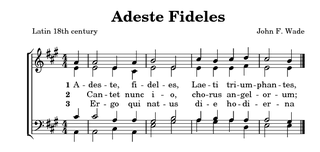
A hymn tune is the melody of a musical composition to which a hymn text is sung. Musically speaking, a hymn is generally understood to have four-part harmony, a fast harmonic rhythm, with or without refrain or chorus.
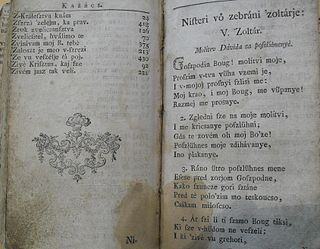
Psalm 5 is the fifth psalm of the Book of Psalms, beginning in English in the King James Version: "Give ear to my words, O LORD, consider my meditation". In Latin, it is known as "Verba mea auribus percipe Domine". The psalm is traditionally attributed to David. It reflects how the righteous man prays for deliverance not only for freedom from suffering, but to allow himself to serve God without distraction. The New King James Version entitles it "A Prayer for Guidance".
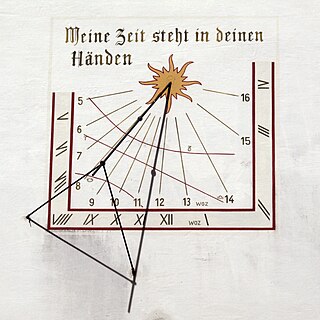
Psalm 31 is the 31st psalm of the Book of Psalms, beginning in English in the King James Version: "In thee, O LORD, do I put my trust". In Latin, it is known as "In te Domine speravi". The Book of Psalms is part of the third section of the Hebrew Bible, and a book of the Christian Old Testament. In the slightly different numbering system used in the Greek Septuagint version of the Bible, and in its Latin translation, the Vulgate, this psalm is Psalm 30. The first verse in the Hebrew text indicates that it was composed by David.

Psalm 34 is the 34th psalm of the Book of Psalms, beginning in English in the King James Version: "I will bless the LORD at all times: his praise shall continually be in my mouth." The Book of Psalms is part of the third section of the Hebrew Bible, and a book of the Christian Old Testament. In the slightly different numbering system used in the Greek Septuagint and Latin Vulgate translations of the Bible, this psalm is Psalm 33. In Latin, it is known as "Benedicam Dominum in omni tempore".

Psalm 139 is the 139th psalm of the Book of Psalms, beginning in English in the King James Version: "O Lord, thou hast searched me, and known me". In Latin, it is known as "Domine probasti me et cognovisti me". The psalm is a hymn psalm. Attributed to David, it is known for its affirmation of God's omnipresence. Alexander Kirkpatrick states that "the consciousness of the intimate personal relation between God and man which is characteristic of the whole Psalter reaches its climax here".

Psalm 73 is the 73rd psalm of the Book of Psalms, beginning in English in the King James Version: "Truly God is good to Israel". In the slightly different numbering system used in the Greek Septuagint and Latin Vulgate translations of the Bible, this psalm is Psalm 72. In Latin, it is known as "Quam bonus Israhel Deus his qui recto sunt corde". Psalm 73 is the opening psalm of Book 3 of the Book of Psalms and the second of the "Psalms of Asaph". It has been categorized as one of the Wisdom Psalms", but some writers are hesitant about using this description because of its "strongly personal tone" and the references in the psalm to the temple. The psalm reflects on "the Tragedy of the Wicked, and the Blessedness of Trust in God".
Psalm 86 is the 86th psalm of the Book of Psalms, beginning in English in the King James Version: "Bow down thine ear, O Lord, hear me: for I am poor and needy". In the slightly different numbering system used in the Greek Septuagint and Latin Vulgate translations of the Bible, this psalm is Psalm 85. In Latin, it is known as "Inclina Domine". It is attributed to David.

The Sidney or Sidneian Psalms are a 16th-century paraphrase of the Psalms in English verse, the work of Philip and Mary Sidney, aristocratic siblings who were influential Elizabethan poets. The Psalms were published after Philip's death in 1586 and a copy was presented to Queen Elizabeth I of England in 1599. The translation was praised in the work of John Donne.
Church music during the Reformation developed during the Protestant Reformation in two schools of thought, the regulative and normative principles of worship, based on reformers John Calvin and Martin Luther. They derived their concepts in response to the Catholic church music, which they found distracting and too ornate. Both principles also pursued use of the native tongue, either alongside or in place of liturgical Latin.














